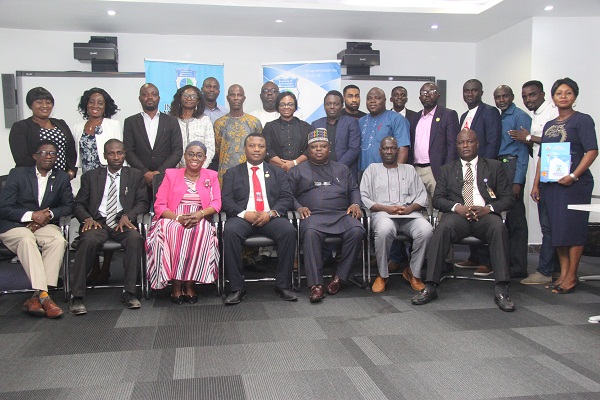Telecom
Experts at IIM Africa Information literacy week harp on proper data management

Information and data management experts have called on government at all levels to initiate policies and measures to ensure proper management of information and data in the country.
The experts gave the advice at an event organised by the Institute of Information Management (IIM Africa) to mark the Information Management and Literacy Week 2019 in Lagos.
The theme of the event was: “A reformed and renewed society through information Literacy”.
The Information Management and Literacy Week were convened to provide several opportunities in finding out about a wide range of services that information management offers.
The 2019 edition highlighted and identified various information gaps, information management needs, and also proffered required framework for effective data/information governance in regulatory agencies across the Country.

IIM Africa members on walk-out exercise
The literacy week also set the parameters for data/information management, usage, creating processes for resolving data/information issues aimed at enabling regulatory bodies and other stakeholders make decisions based on high-quality data and well-managed information assets.
Several speakers and activities lined up for the week-long programe also pin-pointed the vital role which information management services play for research and education.
Speaking at the event, Dr Oyedokun Oyewole, President, Institute of Information Management (IIM), Africa, said that government had a role to play in ensuring the existence of enabling laws, and providing adequate enlightenment to citizens on the need for proper data and information management.
Oyewole said that government could educate citizens by organising workshops, seminars and radio shows in form of jingles that would enlighten citizens on dangers involved when data and information are not properly managed.
”In other climes like America, dissemination of information by journalist is handled ethically and responsibly considering the sensitivity of such information to national security and its importance.
Simply because there are known and established principles, standards, procedures, systems and policies in place to effectively handle such. Such principles, guidelines and policies should also be encouraged and promoted in the African society for balanced reporting by journalists,” Dr. Oyewole said.
He urged government regulatory agencies and private organisations to implement/imbibe policies, laws, systems and best practices that would enhance proper management of data and information.

Launch of IUIM and RIMA founder’s Day award
Emphasising on Information governance (IG) being the overall management of the availability, usability, integrity and security of information used in an organisation.
And the need for regulatory authorities in Nigeria to ensure sound information governance program within their individual agencies with good governing body, charged with defining the set of procedures and plans to execute those procedures.
As Information Governance is required to ensure that organization’s information assets are formally, properly, proactively and efficiently managed throughout the enterprise to secure its trust & accountability, for the ultimate improvement in productivity and efficiency of an organization in meeting regulatory, legal, risk and operational requirements.
The president also commended the National Information Technology Development Agency (NITDA) for recent introduction of data privacy regulations to protect Nigerians and also sensitize them on the need to protect their personal data and information.
In a presentation titled, ‘Best Practices and the Role of the Press in Disseminating Sensitive Information to the Public’,John Montana, a renowned Information Management Expert, said that press occupy a conspicuous position to influence proper information dissemination.
“Our liberty depends on the freedom of the press, and cannot be limited without being lost”, he quoted former US President Thomas Jefferson.
He further quoted Hugo Black who said, “The Government’s power to censor the press was abolished so that the press would remain forever free to censure the Government.
“The press was protected so that it could bare the secrets of the government and inform the people.
“Only a free and unrestrained press can effectively expose the deceptions in government”.
Montana added that the role of the press is to keep the government in power in check, but must be done in accurate and objective manner.
He further cautioned against ‘careless’ reportage of sensitive information such as personal information – financial data, health data, etc; embarrassing information about a crime victim – for example rape; information that may be valuable to criminals, terrorists and other bad actors.
On his part, the Executive Director, Numeric Technologies, Mr Alexander Anago, said that there was need for the government to put in place information protection life cycle strategy to effectively protect, detect, respond and monitor hackers.
“The government needs to provide national gateway for information processing transmission to improve intelligence.
“The government should also implement cross border information security policies, cyber law and information processing policies for proper management of data.
“To effectively manage the data of citizens and the country as a whole the government needs to find a lasting solution to Advanced Persistent Threats.

Cross Section of attendees at IIm Africa Information Literacy workshop
“Advanced Persistent Threats (APT) is a network attack in which unauthorised persons gain access to a network and stay there undetected for a long period of time.
“The intention of an APT attack is to steal data; so, the government needs to adopt sophisticated techniques for early detection of such attacks before it happens,”Anago said.
He said that besides the government, the citizens also needed to stop putting all their personal information, which includes signatures, pictures of their house, cars, children and other private data on social media platform.
Anago also advised people to desist from using public WiFi as it was the easiest way for hackers to gain access to their personal details.
Dr Isa Pantami, the Director-General of NITDA, who was represented by Mr Seyi Ogunseye, a consultant in the Strategic Operations Department, said that the Agency had been creating awareness on the need for proper management of information and data.
He said that Section 6 of NITDA Act 2007 mandates the agency to create a framework for planning, research, development, monitoring, evaluation and regulation of information technology practices and systems in Nigeria.
The Information Management Literacy Week also featured important programmes like Data and Governance Forum/Exhibition; Information Management Session for schools; Novelty Football Match; Founder’s Day/RIMA Awards and official presentation of International University of Information Management (IUIM), United States.
Telecom
NCC Asks Consumers to Monitor Data Usage to Authenticate Consumption

Nigerian Communications Commission (NCC) has charged the over 174 million telecoms subscribers in the country to constantly monitor their data usage to authenticate their consumption level.

This follows concerns being raised by telecoms consumers about the rapidity of data depletion on their devices.
The Commission particularly enjoined the consumers to always contact their service providers to make requests for cases of discrepancies noted in their data usage.
While the consumers are expected to contact their service providers to request for their usage history/statement where inconsistency exists in their data usage as first step, the Commission said they may also escalate such issues to the Commission through its toll-free Number 622 and social media platforms, especially if their requests are not satisfactorily handled.
The Commission, which also made some clarifications regarding the concerns being raised by the consumers around data usage, said the need to inform the consumers on their concerns is part of its commitment to protect and appropriately inform and educate the telecom consumer on industry issues.
Making further clarifications around data speed and usage, the Commission said data speed is the speed at which data is transferred between two devices, measured in megabits per second (Mbps or mbps), stressing that given the spread of Internet services and the immense investment in the sector, data rates have continued to increase and users may be unaware of how to measure data speed.
The telecoms regulator explained further that websites such as www.fast.com also provide an easy way for consumers to measure Internet speed on any device at any location.
“The higher the data speed, the quicker pages load-downloads and uploads-occur and expectedly, the quicker data bundles are exhausted. So, as telecom consumers are able to do more on devices in less time, some consumers’ devices & network service providers make it possible to limit data speed to help users manage data usage better.
“In any case, most devices now include functions to measure data used by devices and it is imperative that users monitor same to authenticate data usage, such as applications left running on devices. Therefore, where discrepancies occur users may contact their service provider to request for their usage history/statement. If request is not dealt with satisfactorily then, users can contact NCC by calling 622 or engage the Commission via its social media platforms”.
It added that the data usage experience is a function of location, network equipment and users connected in a particular location.
Telecom
Phone Theft: AMCODET Urges Mandatory Registration @ Point of Purchase

Association of Mobile Communication Device Technicians of Nigeria (AMCODET), has called on the Nigerian Communications Commission (NCC) to make it mandatory for mobile phones to be registered at the point of purchase.

According to Kehinde Apara, president of AMCODET, implementing this registration process would significantly help in combating phone theft and assist in locating stolen devices.
Apara, made this appeal in an interview in Lagos on Monday.
He stated, “Registration of mobile phones will reduce theft to the barest minimum, as it will be difficult for thieves to sell registered stolen phones.”
Apara explained that the registration of new phones would also help to reduce the harassment faced by technicians by security agencies.
“So many of our members have been labelled accomplices in theft cases, because customers bring stolen phones to them to repair. We believe this is unfair to such innocent people,” he said.
He went on to highlight that the NIN-SIM linkage, which was originally an idea brought forward by AMCODET, was created to curb insecurity and theft.
However, Apara pointed out that “It is not enough.”
He stressed the need for further measures to ensure the proper registration of mobile phones, emphasising that such a step would make it easier for technicians to identify stolen devices brought in for repair or flashing.
“AMCODET has been at the forefront of organising seminars on the security of mobile phones and has also been sensitising the public and authorities on the challenges faced by the association due to phone theft. There is no way our members can identify if a phone is stolen when brought to them for repairs or flashing, but if the phone is registered, the technician can more easily identify it,” he explained.
Apara also expressed a desire for closer collaboration with security agencies, saying, “We want to work with security agencies to ensure that phones are properly registered, theft is prevented, and thieves are brought to book.”
In additin to the call for phone registration, Apara appealed to individuals and the private sector to support efforts to develop the mobile phone industry in Nigeria.
He remarked, “We need individuals’ support to develop our industry, rather than relying on government for everything.”
He emphasised that Nigeria has the capacity to develop its own technology and reduce reliance on imported devices, “With the support of individuals and the private sector, Nigerians can begin to develop its own technology, rather than relying on imported technology.”
Apara expressed optimism for the future of the mobile phone industry in Nigeria, believing that with the right support, the country could build its own technological solutions and move towards greater self-reliance.
“We can develop our own technology.”
“But we need the support of individuals and organisations to make it happen,” he said.
Credit: NAN
Telecom
Apple Faces €150M Fine in France Over Alleged Antitrust Violations

French antitrust regulators have fined Apple 150 million euros ($162 million) over its App Tracking Transparency (ATT) feature, which is facing scrutiny in multiple European countries.

The French Competition Authority ruled that Apple’s implementation of ATT was “neither necessary nor proportionate to the company’s stated goal to protect user data” and unfairly penalized third-party publishers.
Alongside the financial penalty, Apple has been ordered to publish the decision on its website for seven days. The ruling comes amid ongoing investigations in Germany, Italy, Romania, and Poland into ATT, which Apple introduced in 2021 as a privacy safeguard.
ATT requires apps to obtain explicit user consent via a pop-up before tracking activity across other apps and websites. If users decline, the app loses access to their advertising identifier, limiting targeted advertising. Critics argue that the system disproportionately benefits Apple by restricting competitors while promoting its own advertising services.
The French watchdog found that ATT forces users to navigate excessive consent windows for third-party apps on iPhones and iPads, making the process unnecessarily complicated.
Additionally, Apple’s system requires users to opt out of ad tracking twice rather than once, which the authority said undermines the feature’s neutrality and causes economic harm to app publishers and ad service providers.
The ruling emphasized that smaller publishers, which rely heavily on third-party data collection for revenue, are particularly affected.
The French regulator initially declined to impose emergency measures in 2021 after complaints from the advertising industry, but continued its investigation, ultimately leading to Monday’s decision.

 Telecom3 days ago
Telecom3 days agoMTN, Lynk Global Make Africa’s First Satellite-to-Mobile Call

 E-Business3 days ago
E-Business3 days agoSystemSpecs’s Subsidiary Deelaa Becomes Whatadeal

 E-Financial3 days ago
E-Financial3 days agoNigeria Gets Fresh $500m World Bank Loan for Economic Stimulus Programme

 Broadcasting2 days ago
Broadcasting2 days agoDStv Revenue Plunges as MultiChoice Loses Nearly 4m Subscribers

 General News3 days ago
General News3 days agoSERAP Asks National Assembly to Drop Bill to Jail Nigerians who Fail to Vote

 E-Financial3 days ago
E-Financial3 days agoUninsured Depositors of Heritage Bank to Receive Liquidation Dividends In April – NDIC

 Telecom3 days ago
Telecom3 days ago15-Year-Old Autistic Artist, Kanye, to Unveil World’s Largest Art Canvas on Autism Awareness Day

 Telecom3 days ago
Telecom3 days agoSmart Treasure Investment Team’s Initiatives Eradicate Poverty, Says Aminu



























